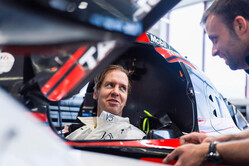


19/08/2025
NEWS STORY
 Four-time world champion Sebastian Vettel admits that he remains unconvinced by the regulations overhaul due next year.
Four-time world champion Sebastian Vettel admits that he remains unconvinced by the regulations overhaul due next year.
There appear to be an increasing number of former drivers eager to share their views on various aspects of the sport, the level of criticism often inversely proportionate to their on-track careers, such as we remember them.
However, when a four-time world champion speaks out, especially one not desirous of establishing himself as a controversial pundit, we should listen.
Sebastian Vettel is not impressed with the coming regulations overhaul, fearing that the sport hasn't learned from the last significant change.
"The new regulations aren't entirely convincing to me yet," he tells Auto Motor und Sport. "Energy recovery is great, but doing it only on the rear axle and ignoring the front axle doesn't make sense to me," he adds.
"The 2014 regulations were good in principle," he continues "The idea behind them was right, but the implementation wasn't. It cost far too much money and didn't bring anything to the series."
The German fears that the sport is focussing too much on cost cutting - which, of course, means bigger profits - at the cost of innovation.
"Innovative solutions from the previous engine regulations are being dispensed with in order to make it less expensive," he says, referring to the regulations still in use. "This is intended to attract new manufacturers.
"The electric component is generally good, and it's also needed in mobility. But on the road, we're already further along with 100 percent electric mobility, due to the unbeatable efficiency."
Warning of the increasing move towards electric, he says: "Motorsport has different requirements. At the Le Mans 24 Hours they are completely different from those in Formula 1 or the junior classes. Either way, it won't work with fully electric drives."
In terms of fuel, he says: "I think climate-neutral fuels are good because there is a need for them in the world outside motorsport, for the many vehicles that are already on the road, for shipping and aircraft.
"What you have to be careful about is the origin of these fuels," he continues. "If you unleash the typical Formula 1 development race on them, things can quickly go in the wrong direction, as was the case in 2014.
"When it comes to fuels, we should close the door by limiting the origin of the molecules and establishing a certain degree of relevance for series production.
"It always comes down to: What are you trying to achieve? How do you achieve it? Where do the resources come from?"
Like many, the German is also concerned at the weight of the cars.
"We're moving a little in that direction now, but it's just a drop in the ocean," he insists. "The cars are far too heavy... they should actually be 200 kilograms lighter."
The former Toro Rosso, Red Bull, Ferrari and Aston Martin driver is also concerned at costs.
"The current engine is too expensive," he says. "Aside from the hybrid version, there hasn't been a transfer to series production because it was too complex and too expensive."
He also warns of the need for regulations that maintain the spirit of the sport.
"From a sporting perspective, the competition must be as close as possible without damaging the spirit of Formula 1," he says. "And people must also be able to afford the sport.
"There will be a move away from this transfer and more towards entertainment," he predicts. "We should stick with what we know, but it needs to be done better in terms of the environment.
"The shoes I buy must be manufactured in a way that does not harm the environment and that production meets fair working conditions. The same applies to cars and motorsport events. It would be a shame if motorsport as we know it ceased to exist. It's perfectly normal for it to change.
"From a sporting perspective, the competition must be as close as possible without damaging the spirit of Formula 1. And people must still be able to afford to watch the sport."